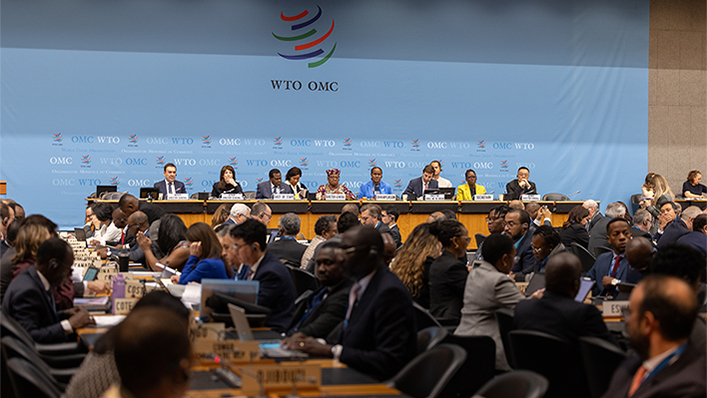The World Trade Organisation (WTO)General Council has reached an important milestone Monday in the global efforts to assist least-developed countries (LDCs) on the path to graduation from LDC status, adopting a decision on the extension of support measures for graduating countries.
The decision was taken as senior officials gather at the WTO on 23- 24 October for a meeting aimed at making preparations for the 13th WTO Ministerial Conference, scheduled for February 2024 in Abu Dhabi.
LDC graduation refers to the point when an LDC meets certain United Nations (UN) development criteria and is no longer defined as an LDC. As the most vulnerable members of the international community, LDCs are accorded special treatment at the WTO, such as enhanced market access opportunities and flexibilities in adopting WTO rules.
The decision encourages WTO members that remove countries from their duty-free and quota-free preference programmes upon graduation from the UN LDC list to provide a smooth and sustainable transition period for the withdrawal of these preferences after graduation. It marks an important contribution to the implementation of the Doha Programme of Action for LDCs for the period 2022-2031.
Welcoming this achievement, Director-General Ngozi Okonjo-Iweala said: “LDC graduation is an important sign of development progress. Today, WTO members reaffirmed their commitment to helping smooth this process for graduating LDCs to prevent any loss of the economic growth and development momentum that had propelled them to graduation. This decision is a significant step towards addressing the particular challenges graduating LDCs face, and will help people from these countries tap into the opportunities that international trade brings. It also is another welcome sign that the wider WTO membership is responding to LDC priorities.”
The chair of the General Council, Ambassador Athaliah Lesiba Molokomme of Botswana, said: “I would like to congratulate all members, in particular the LDCs, on this successful outcome. Let me also express my appreciation to all members, as well as the current and former LDC Group Coordinators and the Focal Point for LDC Graduation, for their tireless efforts and pragmatism to bring this issue to a close. This is commendable and inspiring, and hopefully puts the work and discussions that lie ahead of us, today and tomorrow, on a positive trajectory.”
Ambassador Kadra Ahmed Hassan of Djibouti, Coordinator of the WTO Group of LDCs, said that the decision will provide “some measure of predictability and trust for those of our members on the road to graduation and further integrating into the trading system.” She added: “We also hope that we will be able to replicate and emulate what we are about to do with this decision on LDCs to negotiate and to not wait for Ministerial Conferences to have agreements.”
While graduation from LDC status represents an important milestone in their development, LDCs have underscored the challenges they face trying to integrate into the global economy while international support measures are being phased out.
Over the past three years, the WTO’s LDC group has been pursuing a smooth transition mechanism in the WTO to extend LDC-specific preferences and provisions in WTO agreements after graduation. Discussions are ongoing in the WTO Sub-Committee on LDCs on other elements of the LDCs’ requests relating to special and differential treatment.
The Coordinator of the LDC Group, Ambassador Kadra Ahmed Hassan of Djibouti, said: “LDC graduation has been a key priority for the WTO LDC Group. This decision provides greater predictability and confidence to countries on the path to graduation and to further integration into the multilateral trading system.”
There are currently 46 LDCs, of which 16 are at different stages of the graduation process. Of these, ten are WTO members (Angola, Bangladesh, Cambodia, Djibouti, Lao People’s Democratic Republic, Myanmar, Nepal, Senegal, Solomon Islands and Zambia) and four are negotiating their terms of entry into the WTO (Bhutan, Comoros, Sao Tomé and Principe, and Timor-Leste). The other two LDCs on the graduation path are Kiribati and Tuvalu.
The Doha Programme of Action for LDCs calls for 15 more LDCs to meet the graduation criteria by the end of the decade.
SOURCE: WTO/PACNEWS














